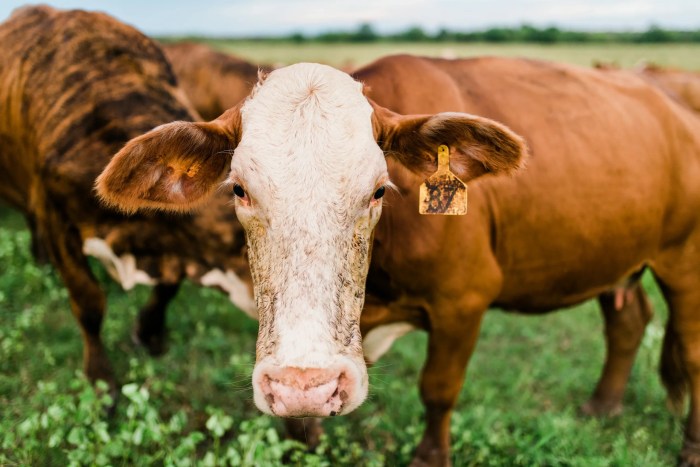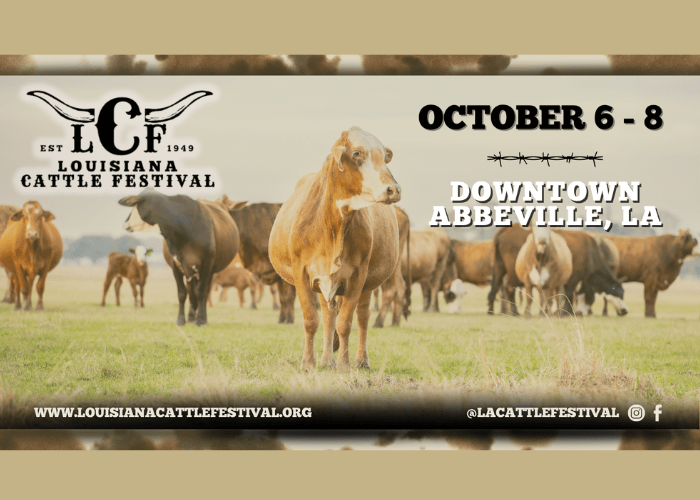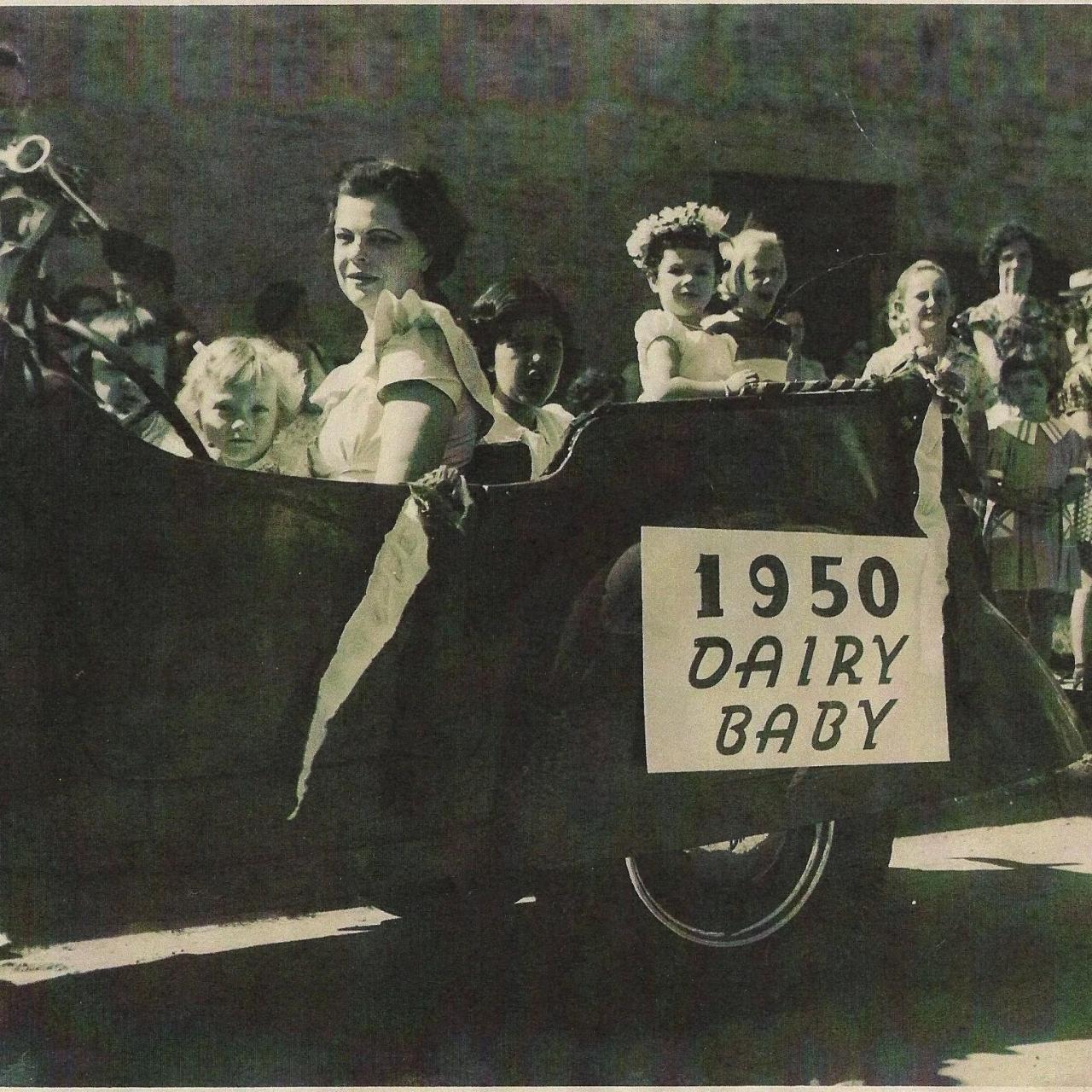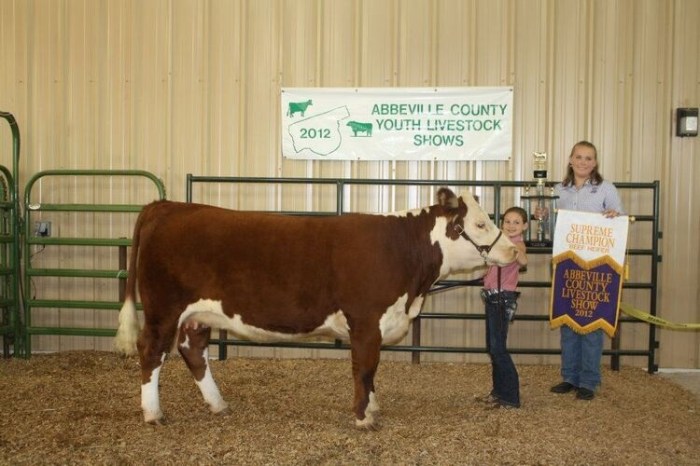Cattle festival in abbeville la – Step into the vibrant world of cattle festivals in Abbeville, Louisiana, where history, culture, and economics intertwine to create an unforgettable experience. These festivals are not just celebrations of the cattle industry but also a testament to the community’s deep-rooted heritage and unwavering spirit.
Abbeville’s cattle festivals have a rich history dating back to the 19th century, showcasing the city’s significant role in the cattle trade. Over the years, these events have evolved into grand spectacles that attract visitors from far and wide, boosting tourism and injecting vitality into the local economy.
Historical Significance of Cattle Festivals in Abbeville, Louisiana
Cattle festivals have a long and storied history in Abbeville, Louisiana, dating back to the mid-19th century. The first recorded cattle festival was held in 1860, and the event has been held annually ever since, except for a brief hiatus during the Civil War.
The origins of the cattle festival can be traced back to the arrival of French settlers in the Abbeville area in the 1760s. The settlers brought with them their own cattle-raising traditions, and the cattle festival quickly became a way for the community to celebrate their shared heritage.
Cattle Festival in Abbeville, LA, is an annual celebration of the town’s rich agricultural heritage. From rodeos to livestock shows, there’s something for everyone. If you’re looking for a comprehensive resource on the topic, check out topic 7 lesson 7-5 answer key . Back to the festival, don’t miss the parade showcasing the finest cattle in the region.
The Cattle Festival in Abbeville, LA, is a true testament to the town’s love for its farming roots.
Notable Cattle Festivals
Over the years, the Abbeville Cattle Festival has grown into one of the largest and most popular events in Louisiana. The festival typically attracts over 100,000 visitors each year, and it features a variety of events, including a rodeo, a livestock show, a carnival, and a parade.
- 1860: The first recorded cattle festival is held in Abbeville.
- 1890: The festival is moved to its current location on the banks of the Vermilion River.
- 1940: The festival is canceled due to World War II.
- 1946: The festival resumes after the war.
- 1960: The festival is expanded to include a rodeo.
- 1980: The festival is designated as a state holiday.
- 2000: The festival is expanded to include a livestock show.
Cultural and Economic Impact
The Abbeville Cattle Festival has a significant cultural and economic impact on the community. The festival is a major tourist attraction, and it brings in millions of dollars in revenue each year. The festival also helps to preserve the Cajun culture of Abbeville, and it provides a sense of community for the residents.
Cattle Industry and its Impact on Abbeville

The cattle industry is a vital part of the Abbeville economy. In 2022, the parish had an estimated 40,000 head of cattle, which generated over $20 million in revenue. The industry supports over 500 jobs in the parish.
Cattle Breeds
The most common cattle breeds raised in Abbeville are Angus, Brahman, and Charolais. Angus cattle are known for their high-quality beef, while Brahman cattle are known for their heat tolerance and resistance to parasites. Charolais cattle are a large breed that is known for its muscle mass.
Cattle Festivals
Cattle festivals play an important role in promoting and supporting the cattle industry in Abbeville. These festivals provide a venue for cattlemen to showcase their animals, network with other producers, and learn about the latest trends in the industry.
Unique Features of Abbeville’s Cattle Festivals

Abbeville’s cattle festivals stand out with their distinctive blend of local involvement, special attractions, and a deep-rooted connection to the region’s cattle industry. These events showcase the community’s pride in its agricultural heritage while providing a lively and memorable experience for attendees.
The festivals are characterized by the enthusiastic participation of local businesses, organizations, and residents. From volunteers who help with event logistics to vendors offering a wide array of products and services, the community comes together to ensure the success of these celebrations.
Special Attractions
Abbeville’s cattle festivals offer a diverse range of attractions that appeal to visitors of all ages. These include:
- Cattle Judging Contests:Renowned for their high caliber, these contests showcase the finest cattle breeds and the skills of local ranchers.
- Rodeo Events:Thrilling competitions such as bull riding, barrel racing, and calf roping provide a glimpse into the equestrian prowess of the region.
- Live Music and Entertainment:Local and regional musicians perform a variety of genres, creating a lively and festive atmosphere.
- Food and Craft Vendors:Attendees can savor local delicacies and browse a wide selection of handmade crafts, supporting local businesses and artisans.
Cultural and Social Aspects of Cattle Festivals: Cattle Festival In Abbeville La

Cattle festivals in Abbeville, Louisiana, are not just about showcasing the town’s rich cattle industry; they are also a celebration of the town’s unique culture and heritage.
These events bring the community together, offering a chance for residents and visitors alike to connect, share stories, and enjoy the local traditions.
Music and Entertainment
Music plays a vital role in Abbeville’s cattle festivals. Local bands perform a variety of genres, from traditional Cajun and zydeco to modern country and rock.
The lively music creates a festive atmosphere and encourages attendees to dance and sing along.
Food and Cuisine
No cattle festival would be complete without delicious food. Abbeville’s festivals feature a wide array of local specialties, including mouthwatering barbecue, freshly caught seafood, and traditional Cajun dishes.
These culinary delights provide a taste of the region’s rich food culture and add to the overall festival experience.
Cultural Preservation
Cattle festivals also serve as a way to preserve local traditions. They provide a platform for showcasing traditional crafts, such as woodworking and leatherworking, and encourage the passing down of skills from one generation to the next.
These events help to ensure that Abbeville’s unique cultural heritage continues to thrive.
Economic Benefits of Cattle Festivals
Cattle festivals in Abbeville have become a significant economic driver for the region. These events attract a large number of visitors, boosting tourism and stimulating local businesses.
Increased Tourism
The festivals draw tourists from across the state and beyond, generating revenue for local hotels, restaurants, and attractions. Visitors spend money on accommodations, dining, shopping, and other activities, contributing to the local economy.
Stimulation of Local Businesses, Cattle festival in abbeville la
Cattle festivals provide a platform for local businesses to showcase their products and services. Vendors sell a variety of items, including food, drinks, crafts, and souvenirs, benefiting small businesses and entrepreneurs.
Economic Indicators
Specific economic indicators demonstrate the positive impact of cattle festivals:
- Increased hotel occupancy rates during festival weekends
- Growth in sales for local restaurants and businesses
- Job creation in the hospitality and tourism sectors
Challenges and Future Prospects of Cattle Festivals

Cattle festivals in Abbeville, like any other event, face certain challenges and hold promising prospects for the future. Understanding these aspects is crucial for the continued success and growth of these festivals.
One challenge is the unpredictable weather conditions in Louisiana. Extreme heat, humidity, or rainfall can disrupt festival activities, affecting attendance and overall enjoyment. Addressing this challenge may involve exploring alternative indoor venues, providing shaded areas, and implementing contingency plans for inclement weather.
Market fluctuations and economic downturns can also impact the viability of cattle festivals. Reduced sponsorship opportunities, lower vendor participation, and decreased attendance can strain festival budgets. To mitigate these effects, organizers should focus on diversifying revenue streams, seeking partnerships with local businesses, and exploring innovative marketing strategies.
Future Prospects
Despite these challenges, cattle festivals in Abbeville have immense growth potential. The city’s rich history, strong agricultural community, and vibrant culture provide a solid foundation for future success.
One promising avenue is to enhance the educational component of the festivals. By incorporating workshops, seminars, and interactive exhibits, organizers can attract a wider audience interested in the cattle industry and its significance. This will not only increase attendance but also promote agricultural education.
Additionally, exploring partnerships with tourism organizations and promoting the festivals as part of a broader cultural experience can attract visitors from outside the region. This will boost tourism revenue and contribute to the overall economic development of Abbeville.
By addressing the challenges and leveraging the opportunities, cattle festivals in Abbeville can continue to thrive and contribute to the city’s cultural heritage, economic vitality, and community spirit.
FAQ Section
When is the next cattle festival in Abbeville, Louisiana?
The dates for the next cattle festival in Abbeville, Louisiana, are yet to be announced. Please check the official website of the Abbeville Chamber of Commerce for updates.
What are the highlights of the cattle festival?
Cattle festivals in Abbeville typically feature a variety of events, including cattle shows, parades, live music, food vendors, and family-friendly activities.
Is there an admission fee for the cattle festival?
Admission to the cattle festival is usually free of charge, but some special events or activities may require a fee.